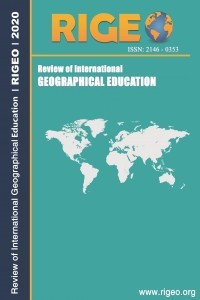Using Geography Textbooks in Competence-Based Education: A Study about the Actors in Germany
Using Geography Textbooks in Competence-Based Education: A Study about the Actors in Germany
Competence-Orientation, Geography Education, Textbook Educational Media, Qualitative Study,
___
- Amtsfeld, P. (2006). Seydlitz - Geographie: GWG Fächerverbund Geographie, Wirtschaft, Ge-meinschaftskunde, Band 3. Braunschweig: Schroedel.
- Bönig, W. & Gaffga, P. (2006). Diercke: Geographie, Wirtschaft, Gemeinschaftskunde; für Gymnasien in Baden-Württemberg, Band 3. Braunschweig: Westemann.
- Dittmar, N. (2009). Transkription: Ein Leitfaden mit Aufgaben für Studenten, Forscher und Laien. Wiesbaden: VS Verlag für Sozialwissenschaften.
- German Geographical Society (Eds.) (2014). Educational standards in geography for the inter-mediate school certificate with sample assignments. Bonn: German Geographical Society.
- Gläser, J. & Laudel, G. (2010). Experteninterviews und qualitative inhaltsanalyse. Wiesbaden: VS Verlag für Sozialwissenschaften. Hoffmann, T., Rendel, A., Renz, K., Rothenberger, G. & Scholliers, M.: 12 Elemente des kom-petenzorientierten Unterrichts. In: Landesakademie für Fortbildung und Personalentwick-lung in Schulen (Ed.); Fachportal Geographie Gymnasium. Retrieved from http://lehrerfortbildung-bw.de/faecher/geographie/gym/fb1/12_element/
- Horn, M. & Schweizer, K. (2015). Ansichten von Geographielehrkräften zum kompetenzorien-tierten Unterricht und ihr Zusammenhang mit Überzeugungen: Ergebnisse einer empiri-schen Befragung. Journal of Geography Education, 43(1), 59-74.
- Klett (2010). Terra - Kompetenzen entwickeln 1, GWG Geographie Wirtschaft. Stuttgart: Klett.
- Leisen, J. (2010). Lernaufgaben als Lernumgebung zur Steuerung von Lernprozessen. In H. Kiper, W. Meints, S. Peters, S. Schlump & S. Schmit (Eds.), Lernaufgaben und Lernma-terialien im kompetenzorientierten Unterricht (pp. 249-278). Wiesbaden: Gabler.
- Leat, D. (1999). Thinking through geography. London: Continuum.
- Mey, G. & Mruck, K. (2007). Qualitative interviews. In G. Naderer & E. Balzer (Eds.), Qualita-tive Marktforschung in Theorie und Praxis. Grundlagen, Methoden und Anwendungen (pp. 249-278). Wiesbaden: Gabler.
- Nichols, A., Kinninment, D. & Leat, D. (1999). More thinking through geography. London: Continuum.
- Obermann, H. (2005). Terra - GWG, Geographie, Wirtschaft, Band 3/4. Stuttgart, Leipzig: Klett-Schulbuchverlag.
- Oelkers, J. & Reusser, K. (2008). Qualität entwickeln - Standards sichern - mit Differenz umge-hen. Berlin, Bonn: BMBF, Referat Bildungsforschung.
- Reinders, H. (2011). Interview. In H. Reinders, H. Ditton, C. Gräsel & B. Griewosz (Eds.), Em-pirische Bildungsforschung: Strukturen und Methoden (pp. 85-97). Wiesbaden: VS Ver-lag für Sozialwissenschaften.
- Schreier, M. (2012). Qualitative content analysis in practice. Los Angeles, London, New Delhi, Singapore, Washington DC: Sage.
- Schuler, S., Coen, A., Hoffmann, T. W., Rohwer, G. & Vankan, L. (2013). Diercke Methoden 2 - Mehr denken lernen mit Geographie. Braunschweig: Westermann.
- Schott, F. & Ghanbari, S. A. (2012). Bildungsstandards, Kompetenzdiagnostik und kompetenz-orientierter Unterricht zur Qualitätssicherung des Bildungswesens. Eine problemorien-tierte Einführung in die theoretischen Grundlagen. Münster, New York, München, Ber-lin: Waxmann.
- Vankan, L., Rohwer, G. & Schuler, S. (2007): Diercke Methoden I - Denken lernen mit Geo-graphie. Braunschweig: Westermann.
- Vollstädt, W., Tillmann, K.-J., Rauin, U., Höhmann, K. & Tebrügge, A. (1999). Lehrpläne im Schulalltag. Eine empirische Studie zur Akzeptanz und Wirkung von Lehrplänen in der Sekundarstufe I. Opladen: Leske und Budrich.
- Weinert, F. E. (Ed.) (2001). Leistungsmessungen in Schulen. Weinheim, Basel: Beltz.
- Wiater, W. (2005). Lehrplan und Schulbuch - Reflexionen über zwei Instrumente des Staates zur Steuerung des Bildungswesens. In E.
- Mathes (Ed.), Das Schulbuch zwischen Lehr-plan und Unterrichtspraxis (pp. 41-63). Bad Heilbrunn/Obb: Klinkhardt.
- Ziener, G. (2013). Bildungsstandards in der Praxis: Kompetenzorientiert unterrichten. Seelze-Velber: Kallmeyer.
- ISSN: 2146-0353
- Başlangıç: 2011
- Yayıncı: Eyüp ARTVİNLİ
Analysis of Geography and Biology Teachers’ Self-Efficacy in Environmental Education
Tahsin YILDIRIM, Mustafa KIŞOĞLU, Muhammed SALMAN
Authentic Social Studies Teaching: The Effect of Semantic Geo-media Material on Learning
Zekeriya Fatih İNEÇ, Erdal AKPINAR
Development of Disaster Awareness Scale: A Validity and Reliability Study
Yurdal DİKMENLİ, Hamza YAKAR, Ahmet Sami KONCA
Theology Teacher Candidates’ Perspectives of Geography
Recent Publications in and Relevant to Geographical Education
Teaching Geography in Higher Education: A Case Study of Problem-Based Learning
Educating World Citizens–Empirical Implications and the Contribution of Geography Education
Marina WAGENER, Susanne KROGULL
Determining the Cognitive Structures of Geography Teacher Candidates Related to Energy Resources
Cartographic Vexillology of Subnational Flags in North America
